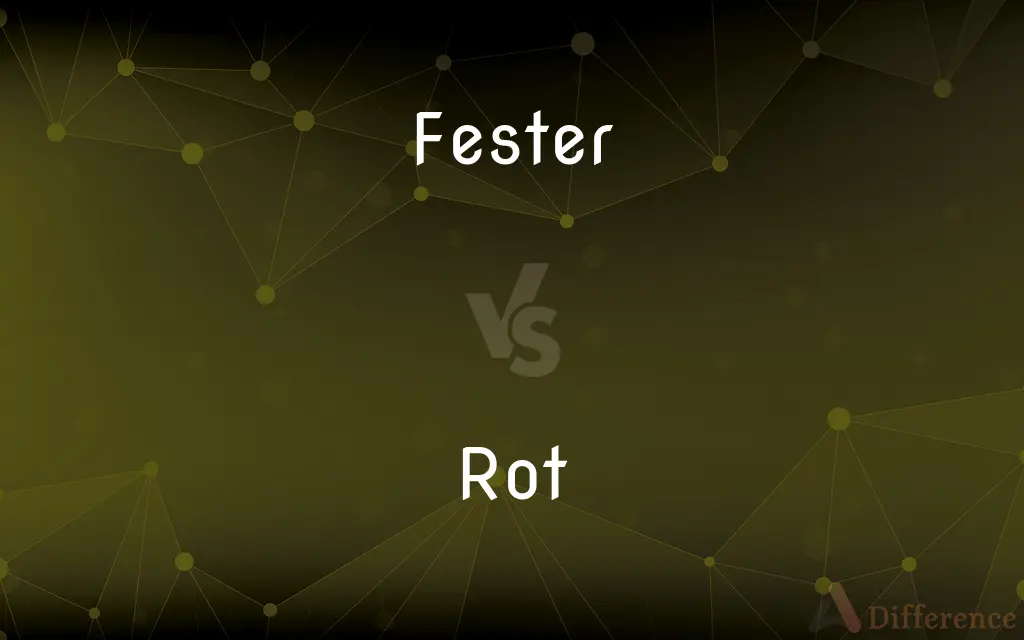Fester vs. Rot — What's the Difference?
By Urooj Arif & Fiza Rafique — Updated on March 15, 2024
Fester refers to the process of becoming worse or more intense, especially in the context of wounds or negative feelings, while rot denotes the process of decay or decomposition, primarily in organic matter.

Difference Between Fester and Rot
Table of Contents
ADVERTISEMENT
Key Differences
Fester often implies a gradual worsening or deterioration, not just physically but emotionally or situationally. On the other hand, rot is specifically about the breakdown or decomposition of organic material. It's a natural process in which matter decays, often resulting in a foul odor and the disintegration of the substance. Rot can affect food, wood, and other organic materials, leading to loss of structural integrity and nutritional value.
While fester can have both literal and metaphorical applications, often associated with negative emotions or situations that worsen over time, rot is primarily a physical process. However, rot can also be used metaphorically to describe the degradation of situations, structures, or systems, implying a loss of vitality or integrity.
The concept of festering is closely related to neglect or the lack of proper care, indicating that the situation could potentially be remedied with timely intervention. In contrast, rot often points to an inevitable process of decay that, once begun, is difficult to reverse. For instance, emotional issues might fester and become more complicated if not addressed, whereas food left out will inevitably rot.
In medical contexts, festering is associated with infection and the presence of pus, signaling the body's fight against intrusion, requiring medical intervention. Rot, in such contexts, might refer to necrosis or the death of cells and tissues in a living organism, often irreversible and leading to the necessity of removal.
Comparison Chart
Definition
To become worse or more intense over time.
The process of decay or decomposition.
ADVERTISEMENT
Context
Can be physical or metaphorical.
Primarily physical, but also metaphorical.
Implication
Implies underlying issues, neglect.
Indicates natural decay, loss of integrity.
Reversibility
Potentially reversible with intervention.
Often irreversible once advanced.
Example
An untreated wound; unresolved anger.
Decaying food; deteriorating wood.
Compare with Definitions
Fester
To become rotten and produce pus, as in a wound.
The wound festered because it was not properly cleaned.
Rot
The process of decomposing or decaying organic matter.
The vegetables began to rot after a week.
Fester
The process of seething or bubbling up.
Discontent festered among the population.
Rot
To decline in health, vigor, or quality.
The produce rotted away before it could be sold.
Fester
To worsen or become more intense, especially of negative feelings.
His anger festered into resentment over the years.
Rot
The deterioration of a situation, system, or relationship.
Corruption caused the organization to rot from within.
Fester
To undergo deterioration of a situation or condition.
The dispute festered due to lack of communication.
Rot
The state of decay caused by fungal or bacterial action.
Rot has set in the abandoned building's structure.
Fester
To be in a state of progressive deterioration.
The project festered due to mismanagement.
Rot
Waste away;
Political prisoners are wasting away in many prisons all over the world
Fester
To be subject to or exist in a condition of decline
Allowed the once beautiful park to fester.
Rot
(chiefly of animal or vegetable matter) decay or cause to decay by the action of bacteria and fungi; decompose
The chalets were neglected and their woodwork was rotting away
Caries sets in at a weak point and spreads to rot the whole tooth
Fester
To infect, inflame, or corrupt.
Rot
Make fun of; tease
Has anybody been rotting you?
Fester
A small festering sore or ulcer; a pustule.
Rot
The process of decaying
The leaves were turning black with rot
Fester
A fistula.
Rot
A process of deterioration; a decline in standards
There is enough talent in the team to stop the rot
It was when they moved back to the family home that the rot set in
Fester
(pathology) A sore or an ulcer of the skin.
Rot
Nonsense; rubbish
Don't talk rot
‘Rot!’ she said with vehemence
Fester
The condition of something that festers; a festering; a festerment.
Rot
To undergo decomposition, especially organic decomposition; decay.
Fester
(intransitive) To become septic; to become rotten.
Rot
To become damaged, weakened, or useless because of decay
The beams had rotted away.
Fester
(intransitive) To worsen, especially due to lack of attention.
Deal with the problem immediately; do not let it fester.
Rot
To disappear or fall by decaying
One could see the blackened areas where the branches had rotted off.
Fester
(transitive) To cause to fester or rankle.
Rot
To deteriorate through neglect or inactivity; languish or decline
"He upset Alice by calling Washington ... a sink of boredom and saying he was rotting there" (John Dos Passos).
Fester
To generate pus; to become imflamed and suppurate; as, a sore or a wound festers.
Wounds immedicableRankle, and fester, and gangrene.
Unkindness may give a wound that shall bleed and smart, but it is treachery that makes it fester.
Hatred . . . festered in the hearts of the children of the soil.
Rot
To decay morally; become degenerate.
Fester
To be inflamed; to grow virulent, or malignant; to grow in intensity; to rankle.
Rot
To cause to decompose or decay.
Fester
A small sore which becomes inflamed and discharges corrupt matter; a pustule.
Rot
The process of rotting or the condition of being rotten
The rot spread quickly, rendering the bridge unsafe even for pedestrians.
Fester
A festering or rankling.
The fester of the chain their necks.
Rot
Foot rot.
Fester
A sore that has become inflamed and formed pus
Rot
Any of several plant diseases characterized by the breakdown of tissue and caused by various bacteria, fungi, or oomycetes.
Fester
Ripen and generate pus;
Her wounds are festering
Rot
Pointless talk; nonsense
She always talks such rot.
Fester
To generate pus; suppurate.
Rot
(Archaic) Any of various diseases causing the decay of flesh.
Fester
To form an ulcer.
Rot
(intransitive) To suffer decomposition due to biological action, especially by fungi or bacteria.
The apple left in the cupboard all that time had started to rot.
Fester
To undergo decay; rot.
Rot
(intransitive) To decline in function or utility.
Your brain will rot if you spend so much time on the computer, Tony!
Fester
To be or become an increasing source of irritation or poisoning; rankle
Bitterness that festered and grew.
Rot
(ambitransitive) To (cause to) deteriorate in any way, as in morals; to corrupt.
Rot
(transitive) To make putrid; to cause to be wholly or partially decomposed by natural processes.
To rot vegetable fiber
Rot
To spend a long period of time (in an unpleasant place).
To rot in prison
To rot in Hell
Rot
(transitive) To expose, as flax, to a process of maceration, etc., for the purpose of separating the fiber; to ret.
Rot
To talk nonsense.
Rot
The process of becoming rotten; putrefaction.
Rot
Decaying matter.
Rot
Any of several diseases in which breakdown of tissue occurs.
Rot
(uncountable) Verbal nonsense.
Rot
To undergo a process common to organic substances by which they lose the cohesion of their parts and pass through certain chemical changes, giving off usually in some stages of the process more or less offensive odors; to become decomposed by a natural process; to putrefy; to decay.
Fixed like a plant on his peculiar spot,To draw nutrition, propagate, and rot.
Rot
Figuratively: To perish slowly; to decay; to die; to become corrupt.
Four of the sufferers were left to rot in irons.
Rot, poor bachelor, in your club.
Rot
To make putrid; to cause to be wholly or partially decomposed by natural processes; as, to rot vegetable fiber.
Rot
To expose, as flax, to a process of maceration, etc., for the purpose of separating the fiber; to ret.
Rot
Process of rotting; decay; putrefaction.
Rot
A disease or decay in fruits, leaves, or wood, supposed to be caused by minute fungi. See Bitter rot, Black rot, etc., below.
Rot
A fatal distemper which attacks sheep and sometimes other animals. It is due to the presence of a parasitic worm in the liver or gall bladder. See 1st Fluke, 2.
His cattle must of rot and murrain die.
Rot
Decay usually accompanied by an offensive odor
Rot
(biology) decaying caused by bacterial or fungal action
Rot
Unacceptable behavior (especially ludicrously false statements)
Rot
Break down;
The bodies decomposed in the heat
Common Curiosities
What does it mean when food rots?
When food rots, it undergoes decomposition due to bacteria or fungi, resulting in a breakdown of organic material and often producing a foul odor.
Is rot always a bad thing?
While rot is typically undesirable, it is a natural part of organic decay and crucial for recycling nutrients in ecosystems.
How can rot affect buildings?
Rot can compromise the structural integrity of buildings, especially through the decay of wooden components.
What is the difference between rotting and fermenting?
Rotting is decomposition causing material to break down and lose quality, while fermenting is controlled decomposition that can preserve food or produce new products.
What can be done to treat a festering wound?
Cleaning, applying appropriate medication, and sometimes medical intervention are necessary to treat a festering wound.
Can relationships fester?
Yes, relationships can fester when issues are not addressed, leading to increased negativity and deterioration over time.
How can one prevent a situation from festering?
Addressing the underlying issues promptly and effectively can prevent a situation from festering.
Is festering a medical term?
In a medical context, festering refers to the presence of pus and indicates an infection that needs treatment.
What causes something to fester?
Festering is caused by neglect or lack of treatment, especially in wounds or negative emotions, leading to worsening conditions.
Can emotional wounds fester?
Emotional wounds can fester if not dealt with, leading to long-term psychological harm.
How do you identify if food has started to rot?
Signs include unpleasant odors, discoloration, slimy texture, and the presence of mold.
Why is it important to address festering issues early?
Early intervention can prevent complications, reduce harm, and lead to better outcomes in both health and situational contexts.
Can a society rot?
Yes, metaphorically, a society can rot if its foundational principles, structures, or values deteriorate, leading to decay in social integrity and function.
Can neglect cause both festering and rot?
Yes, neglect can lead to festering in wounds or situations and rot in organic materials by failing to address necessary care or conditions.
Share Your Discovery

Previous Comparison
Basilica vs. Cathedral
Next Comparison
Nail vs. PinAuthor Spotlight
Written by
Urooj ArifUrooj is a skilled content writer at Ask Difference, known for her exceptional ability to simplify complex topics into engaging and informative content. With a passion for research and a flair for clear, concise writing, she consistently delivers articles that resonate with our diverse audience.
Co-written by
Fiza RafiqueFiza Rafique is a skilled content writer at AskDifference.com, where she meticulously refines and enhances written pieces. Drawing from her vast editorial expertise, Fiza ensures clarity, accuracy, and precision in every article. Passionate about language, she continually seeks to elevate the quality of content for readers worldwide.














































